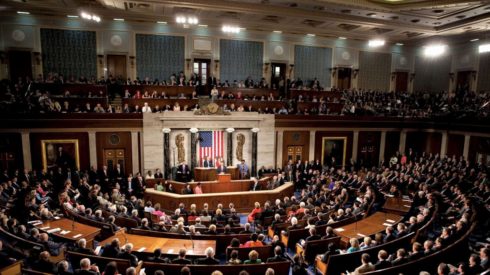The International Criminal Court (ICC) prosecutor has applied for arrest warrants against Israeli Prime Minister Benjamin Netanyahu, Israeli Defence Minister Yoav Gallant, and three leaders of Hamas, in relation to the war in Gaza. This move has sparked a strong response from the United States House of Representatives, which has voted to pass legislation that would sanction the ICC and its officials involved in the case.
The decision to seek arrest warrants has drawn criticism from pro-Israel Republicans, who view the ICC’s actions as a threat to Israel’s sovereignty and a potential overreach of the court’s jurisdiction. The proposed sanctions aim to block the entry of the involved ICC officials into the United States and restrict their ability to engage in property transactions within the country.
Controversial Legislation Divides House, Unlikely to Become Law
The Illegitimate Court Counteraction Act, introduced by Texas Republican Congressman Chip Roy, passed the House with a majority of Republican support and the backing of 42 pro-Israel Democrats. However, the legislation is not expected to become law, as it will likely be ignored by the Democrat-controlled Senate.
President Joe Biden has also expressed strong opposition to the bill, with his administration stating that it does not support the proposed sanctions. Despite this, some Senate Democrats, such as John Fetterman of Pennsylvania, have indicated their support for sanctioning the ICC, calling the arrest warrants “trash.”
Debate Highlights Tension Between United States Sovereignty and International Justice
The passage of the legislation in the House has reignited the debate surrounding the balance between United States sovereignty and the role of international justice institutions like the ICC. Supporters of the bill argue that the ICC’s actions threaten United States sovereignty and could set a dangerous precedent for the court’s involvement in the affairs of other nations.
However, opponents of the measure, including some Democrats who support Israel but have criticized Prime Minister Netanyahu’s conservative government, argue that the legislation risks forcing the United States to sanction ally nations that support the ICC. They also contend that the bill undermines the rules-based international order that the United States has helped to build and maintain.
As the legislation moves to the Senate, it remains to be seen whether it will gain traction or face further opposition. The debate surrounding the ICC’s arrest warrants and the United States response highlights the ongoing tension between national sovereignty and international justice, as well as the complexities of navigating foreign policy in an increasingly interconnected world.
ICC’s Allegations and Reactions
Last month, ICC chief prosecutor Karim Khan announced that he had “reasonable grounds” to believe that Prime Minister Netanyahu, Defense Minister Yoav Gallant, Hamas’s Gaza leader Yahya Sinwar, military chief Mohammed Deif, and political leader Ismail Haniyeh bore “criminal responsibility” for alleged war crimes and crimes against humanity during the Gaza war. This marked the first time the ICC has targeted the top leader of a close United States ally.
The Israeli government and Hamas reacted with outrage to Mr. Khan’s announcement. Prime Minister Netanyahu denounced the warrant applications against him and Mr. Gallant as a “moral outrage of historic proportions,” while Mr. Gallant accused the prosecutor of drawing a “despicable” parallel between Israel and Hamas and attempting to deny Israel’s right to self-defense. Hamas, on the other hand, demanded the cancellation of the warrant applications for its leaders and denounced what it called Mr. Khan’s attempts “to equate the victim with the executioner.”
The ICC’s Role and US Stance
The International Criminal Court (ICC), created by a UN treaty in 2002, investigates and brings to justice those responsible for genocide, crimes against humanity, and war crimes, intervening when national authorities cannot or will not prosecute. The United States and Israel are not members of the ICC and do not recognize its jurisdiction, but the United States has previously backed its prosecutions and arrest warrants not related to Israel and the Palestinians.
However, the White House has stated that while the ICC prosecutor’s warrant applications for Israeli leaders were “outrageous,” it does not support sanctioning the ICC. The administration believes there are more effective ways to defend Israel, preserve United States positions on the ICC, and promote international justice and accountability, and stands ready to work with Congress on those options.














